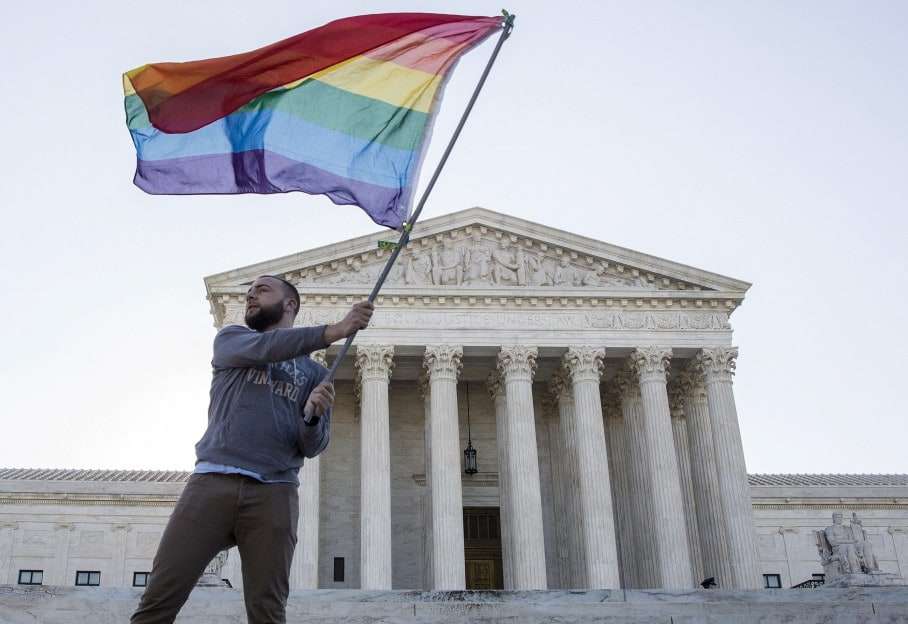The Volokh Conspiracy
Mostly law professors | Sometimes contrarian | Often libertarian | Always independent
The Supreme Court oral argument that cost Democrats the presidency

The presidential election was so close that many factors were "but-for" causes of Donald Trump's victory. One that's been mostly overlooked is Trump's surprising success with religious voters. According to exit polls, Trump received 81 percent of the white evangelical Christian vote, and Hillary Clinton only 16 percent. Trump did significantly better than the overtly religious Mitt Romney and the overtly evangelical George W. Bush. He likely over-performed among other theologically conservative voters, such as traditionalist Catholics, as well. Not bad for a thrice-married adulterer of no discernible faith.
To what can we attribute Trump's success? The most logical answer is that religious traditionalists felt that their religious liberty was under assault from liberals, and they therefore had to hold their noses and vote for Trump. As Sean Trende of RealClear Politics noted, since 2012:
Democrats and liberals have: booed the inclusion of God in their platform at the 2012 convention (this is disputed, but it is the perception); endorsed a regulation that would allow transgendered students to use the bathroom and locker room corresponding to their identity; attempted to force small businesses to cover drugs they believe induce abortions; attempted to force nuns to provide contraceptive coverage; forced Brendan Eich to step down as chief executive officer of Mozilla due to his opposition to marriage equality; fined a small Christian bakery over $140,000 for refusing to bake a cake for a same-sex wedding; vigorously opposed a law in Indiana that would provide protections against similar regulations - despite having overwhelmingly supported similar laws when they protected Native American religious rights - and then scoured the Indiana countryside trying to find a business that would be affected by the law before settling upon a small pizza place in the middle of nowhere and harassing the owners. In 2015, the United States solicitor general suggested that churches might lose their tax exempt status if they refused to perform same-sex marriages. In 2016, the Democratic nominee endorsed repealing the Hyde Amendment, thereby endorsing federal funding for elective abortions.
Megan McArdle of Bloomberg similarly pointed out, "Over the last few years, as controversies have erupted over the rights of cake bakers and pizza places to refuse to cater gay weddings, the rights of nuns to refuse to provide insurance that covers birth control, the rights of Catholic hospitals to refuse to perform abortions, and the rights of Christian schools to teach (and require students and teachers to practice) traditional Christian morality, some Christians have begun to feel that their communities are under existential threat."
http://www.washingtonpost.com/video/politics/how-the-electoral-college-works/2016/12/08/ecea6ede-bd35-11e6-ae79-bec72d34f8c9_video.html
Let's focus on one of these incidents, the time the solicitor general of the United States acknowledged that religious institutions that oppose as a matter of internal policy same-sex marriage may lose their tax exemptions. At oral argument in the Obergefell same-sex marriage case, there was the following colloquy:
Justice Samuel Alito: Well, in the Bob Jones case, the Court held that a college was not entitled to taxexempt status if it opposed interracial marriage or interracial dating. So would the same apply to a university or a college if it opposed same sex marriage?
Soliticitor General Verrilli: You know, I , I don't think I can answer that question without knowing more specifics, but it's certainly going to be an issue. I don't deny that. I don't deny that, Justice Alito. It is it is going to be an issue.
With the mainstream media busy celebrating the Supreme Court's ultimate recognition of a right to same-sex marriage, this didn't get that much attention in mainstream news outlets. But in the course of researching my book, "Lawless," I noticed that Solicitor General Donald B. Verrilli Jr.'s answer was big news in both the conservative blogosphere and in publications catering to religiously traditionalist audiences. The idea that Regent University or Brigham Young University or the local Catholic university or the many hundreds of other religious schools - and potentially other religious organizations - could be put at a severe competitive disadvantage if they refused on theological grounds to extend the same recognition to same-sex couples as to opposite-sex couples struck many as a direct and serious assault on religious liberty.
In short, many religious Christians of a traditionalist bent believed that liberals not only reduce their deeply held beliefs to bigotry, but want to run them out of their jobs, close down their stores and undermine their institutions. When I first posted about this on Facebook, I wrote that I hope liberals really enjoyed running Brendan Eich out of his job and closing down the Sweet Cakes bakery, because it cost them the Supreme Court. I'll add now that I hope Verrilli enjoyed putting the fear of government into the God-fearing because it cost his party the election.
UPDATE: As co-blogger Todd Zywicki wrote to me on Facebook, "When you find yourself in the Supreme Court adverse to the Little Sisters of the Poor you might consider whether maybe you have pushed a little too far."


Show Comments (0)